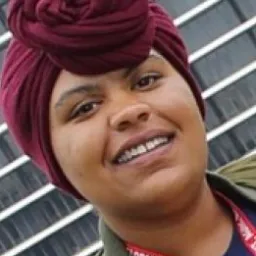More than anything I want to create a world where youth in foster care don’t have to fear being alone and not having a place to live. That’s why I’m attending Cal State Los Angeles, studying to become a social worker. In fact, just before the pandemic hit I had received my offer letter to do my fieldwork placement with the Department of Children and Family Services. I am so very excited about this placement opportunity, because my dreams of giving back to the foster care system are so close to being realized. But now, as a former foster youth in the middle of the Covid19 crisis I find myself floundering. I’m lonely, hungry and homeless.
Just like that, my transition to adulthood became even more difficult. I was becoming self-sufficient and flourishing on my college campus. For youth in foster care, transitioning to adulthood is challenging and often faced without family support.
Nevertheless, I am confident that I will succeed. It’s in the fabric of my makeup. I have already helped pass two local laws with California Youth Connects and I am a founder and current member of the Los Angeles Reproductive Health Equity Project Youth Advisory Board. I’ve been volunteering in my community for over 13 years. My passion is advocating for my peers who have experienced foster care.
I’m what they call “housing insecure” which means I don’t have a stable place to live. I go between couch surfing and living out of my RV [recreational vehicle]. I also don’t have a quiet place to study, because my school is closed. Almost everything in the community is closed making it hard for me to access WiFi, which means my school work is in jeopardy. This worries me most, because school is my major escape. It’s what I pour all of my time and energy into. Thinking about my future is what makes me forget the pain of my past. Many programs that offer assistance are impacted. My school is offering students emergency grants, but only if you take out loans.
I’m sad that I can’t see my therapist in my normal routine. I have OCD and anxiety as well as a pre-existing heart condition. Additionally, I have cancelled all of my doctors appointments, because I am scared of exposing myself to the virus. I fear the worst, getting sick and facing death due to being in the vulnerable health category.
For food, I can usually go to local food banks where I need, however all of the food banks are severely strained. I’ve been turned down as they can no longer provide food boxes to a single family household. It’s an unfair predicament to be in; it pits one vulnerability against another. I know that other youth like me, formerly in foster care will fall between the cracks during this crisis, just when we were positioned to get a leg up in life.
On the bright side, I’m thankful for kind people who understand the challenging place youth like me are in. Recently, I met a lady who lets me take showers at her house. During this time of serious isolation, I find her to be very nice company.
In reading the news about Congress taking action to support hurting businesses and corporations, I want to call on members of Congress to remember youth like me, those on the margins of our society. Specifically, I want to ask for increased support to programs that help us in real time, programs such as the Chafee Foster Care Independence Program (CFCIP also known as “Chafee”), which provides flexible funding to meet youth’s needs. Programs under Chafee include help with vouchers for education and job training, employment, financial management, housing and emotional support.
My hope right now is that my experiences and concerns don’t fall on deaf ears. I want youth in and formerly in foster care to feel supported and looked after in this time of uncertainty.
---
This perspective piece was written by Alexis Obinna, a 24 year-old graduate student at Cal State University Los Angeles.

